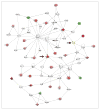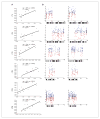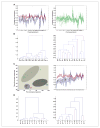Aneuploidy-dependent massive deregulation of the cellular transcriptome and apparent divergence of the Wnt/beta-catenin signaling pathway in human rectal carcinomas
- PMID: 16397240
- PMCID: PMC4737482
- DOI: 10.1158/0008-5472.CAN-05-2533
Aneuploidy-dependent massive deregulation of the cellular transcriptome and apparent divergence of the Wnt/beta-catenin signaling pathway in human rectal carcinomas
Abstract
To identify genetic alterations underlying rectal carcinogenesis, we used global gene expression profiling of a series of 17 locally advanced rectal adenocarcinomas and 20 normal rectal mucosa biopsies on oligonucleotide arrays. A total of 351 genes were differentially expressed (P < 1.0e-7) between normal rectal mucosa and rectal carcinomas, 77 genes had a >5-fold difference, and 85 genes always had at least a 2-fold change in all of the matched samples. Twelve genes satisfied all three of these criteria. Altered expression of genes such as PTGS2 (COX-2), WNT1, TGFB1, VEGF, and MYC was confirmed, whereas our data for other genes, like PPARD and LEF1, were inconsistent with previous reports. In addition, we found deregulated expression of many genes whose involvement in rectal carcinogenesis has not been reported. By mapping the genomic imbalances in the tumors using comparative genomic hybridization, we could show that DNA copy number gains of recurrently aneuploid chromosome arms 7p, 8q, 13q, 18q, 20p, and 20q correlated significantly with their average chromosome arm expression profile. Taken together, our results show that both the high-level, significant transcriptional deregulation of specific genes and general modification of the average transcriptional activity of genes residing on aneuploid chromosomes coexist in rectal adenocarcinomas.
Figures





Similar articles
-
Gene expression profiling reveals a massive, aneuploidy-dependent transcriptional deregulation and distinct differences between lymph node-negative and lymph node-positive colon carcinomas.Cancer Res. 2007 Jan 1;67(1):41-56. doi: 10.1158/0008-5472.CAN-06-1514. Cancer Res. 2007. PMID: 17210682 Free PMC article.
-
Comparative genomic hybridization reveals frequent gains of 20q, 8q, 11q, 12p, and 17q, and losses of 18q, 9p, and 15q in pancreatic cancer.Genes Chromosomes Cancer. 1997 Dec;20(4):383-91. doi: 10.1002/(sici)1098-2264(199712)20:4<383::aid-gcc10>3.0.co;2-o. Genes Chromosomes Cancer. 1997. PMID: 9408755
-
Genomic aberrations in carcinomas of the uterine corpus.Genes Chromosomes Cancer. 2004 Jul;40(3):229-46. doi: 10.1002/gcc.20038. Genes Chromosomes Cancer. 2004. PMID: 15139002
-
Wnt2 complements Wnt/β-catenin signaling in colorectal cancer.Oncotarget. 2015 Nov 10;6(35):37257-68. doi: 10.18632/oncotarget.6133. Oncotarget. 2015. PMID: 26484565 Free PMC article.
-
The consequences of chromosomal aneuploidy on the transcriptome of cancer cells.Biochim Biophys Acta. 2012 Jul;1819(7):784-93. doi: 10.1016/j.bbagrm.2012.02.020. Epub 2012 Mar 6. Biochim Biophys Acta. 2012. PMID: 22426433 Free PMC article. Review.
Cited by
-
Mutated KRAS results in overexpression of DUSP4, a MAP-kinase phosphatase, and SMYD3, a histone methyltransferase, in rectal carcinomas.Genes Chromosomes Cancer. 2010 Nov;49(11):1024-34. doi: 10.1002/gcc.20811. Genes Chromosomes Cancer. 2010. PMID: 20725992 Free PMC article.
-
Can survival prediction be improved by merging gene expression data sets?PLoS One. 2009 Oct 23;4(10):e7431. doi: 10.1371/journal.pone.0007431. PLoS One. 2009. PMID: 19851466 Free PMC article.
-
A computational procedure to identify significant overlap of differentially expressed and genomic imbalanced regions in cancer datasets.Nucleic Acids Res. 2009 Aug;37(15):5057-70. doi: 10.1093/nar/gkp520. Epub 2009 Jun 19. Nucleic Acids Res. 2009. PMID: 19542187 Free PMC article.
-
Beta-catenin expression results in p53-independent DNA damage and oncogene-induced senescence in prelymphomagenic thymocytes in vivo.Mol Cell Biol. 2008 Mar;28(5):1713-23. doi: 10.1128/MCB.01360-07. Epub 2007 Dec 26. Mol Cell Biol. 2008. PMID: 18160717 Free PMC article.
-
Chromosomal breakpoints in primary colon cancer cluster at sites of structural variants in the genome.Cancer Res. 2008 Mar 1;68(5):1284-95. doi: 10.1158/0008-5472.CAN-07-2864. Cancer Res. 2008. PMID: 18316590 Free PMC article.
References
-
- Midgley R, Kerr D. Colorectal cancer. Lancet. 1999;353:391–9. - PubMed
-
- Bardi G, Sukhikh T, Pandis N, Fenger C, Kronborg O, Heim S. Karyotypic characterization of colorectal adenocarcinomas. Genes Chromosomes Cancer. 1995;12:97–109. - PubMed
-
- Fearon ER, Vogelstein B. A genetic model for colorectal tumorigenesis. Cell. 1990;61:759–67. - PubMed
-
- Ried T, Knutzen R, Steinbeck R, et al. Comparative genomic hybridization reveals a specific pattern of chromosomal gains and losses during the genesis of colorectal tumors. Genes Chromosomes Cancer. 1996;15:234–45. - PubMed
-
- Leslie A, Carey FA, Pratt NR, Steele RJ. The colorectal adenoma-carcinoma sequence. Br J Surg. 2002;89:845–60. - PubMed
Publication types
MeSH terms
Substances
Grants and funding
LinkOut - more resources
Full Text Sources
Medical
Research Materials
Miscellaneous

